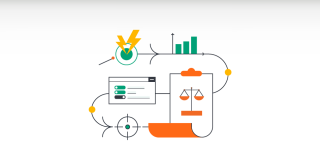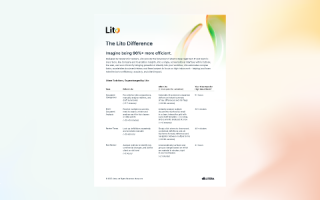Legal Technology 101: What Your Law Firm Needs to Know
In today's dynamic and interconnected world, technology has become an integral part of almost every aspect of our lives. The legal industry, long considered traditional and cautious in its approaches, is also embracing the wave of technological advancements. In this blog, we're delving into what legal technology is, its implications, and how Litera is utilizing legal tech and AI to revolutionize the practice of law.
What is Legal Technology?
Legal technology can be defined as the wide spectrum of digital tools, software, applications, and platforms designed to enhance various facets of legal practice. From streamlining tedious administrative tasks to transforming how legal research is conducted, legal tech is all about equipping legal professionals with the tools they need to work more efficiently, accurately, and collaboratively.
The Top 4 Advantages of Using Legal Technology
Legal technology offers firms an abundance of benefits, with some key advantages including:
- Boosting Efficiency: Legal tech is a boon for optimizing workflows and processes. Repetitive tasks like document review, contract drafting, review, and analysis, and research into past matters and precedent transactions can now be automated, freeing up valuable time for attorneys to focus on higher-value strategic work.
- Enhancing Accuracy: Accuracy is paramount in the legal realm, and legal tech rises to the challenge. Advanced software can sift through vast volumes of information in legal documents like contracts, identify relevant data points, and offer insights that inform legal strategies.
- Empowering Collaboration: Collaboration among legal teams, clients, and other stakeholders is seamless and secure with the right legal tech. Cloud-based platforms facilitate real-time communication, assignment of tasks, document sharing, and collaborative editing, regardless of geographical barriers.
- Meeting Client Expectations: Clients today demand transparency, prompt communication, and real-time updates. Legal tech empowers legal professionals to meet these expectations by offering secure client portals, virtual communication tools, and easy access to case information.
The Top 5 Kinds of Legal Technology Law Firms Use
Legal professionals in the digital age are equipped with an array of innovative technologies that enhance their practice. Below are just a few examples, but there are a vast array of tech products available to lawyers.
1. Data Analysis: Sorting through your law firm’s internal data to identify trends and build budgets can be time consuming. Legal tech solutions simplify this process, extracting relevant information and surfacing your internal data into clean, user-friendly dashboards. BigSquare provides business intelligence applications to transform your data into dashboards that are actionable, intuitive, and customizable.
2. Contract Review and Analysis: Legal tech streamlines processes like due diligence for corporate transactions and contract lifecycle management so that lawyers can find the information they need more quickly, without sacrificing quality. AI-powered contract analysis reduces risks, increases efficiency, and ensures compliance. Legal AI is becoming a must-have at law firms. Tools like Kira utilize machine learning software and generative AI to identify, extract, and summarize content in your contracts with unparalleled accuracy and efficiency.
3. Document Drafting: Document drafting technology is crucial for law firms as it streamlines processes, enhances accuracy, and boosts efficiency in creating legal documents, ultimately improving client service and saving time. Litera Draft is the legal industry’s only unified solution that supports the best-of-breed document drafting technology through a single Word ribbon, streamlining the lawyer’s workflow and creating operational efficiencies for IT departments.
4. Virtual Collaboration Platforms: In an increasingly digital world, virtual collaboration tools facilitate communication and teamwork, regardless of geographical boundaries. For example, tools like CAM mitigate data chaos, minimize privacy and cybersecurity risks, and reduce the costs of using multiple collaboration systems.
5. Transaction Management: Transaction management software simplifies complex document and task handling required for a transaction to be signed and closed, increasing efficiency and reducing the risk of errors for legal professionals. It fosters collaboration, streamlining teamwork through centralized document sharing, signature tracking, and closing set creation. With automation and adaptive workflow features, it enhances organization throughout the course of a deal, ultimately boosting client satisfaction and firm productivity. Tools like Litera Transact enable legal professionals to securely manage corporate transactions with dynamic checklists, intelligent process automation for signatures and closings, and closing book creation.
What is the Most Commonly Used Legal Technology?
Among the various innovations reshaping the legal landscape, document management systems stand out as one of the most common and impactful legal technologies. These systems provide a centralized platform for lawyers to store, organize, and collaborate on legal documents securely. With features like version control, real-time collaboration, and secure access, document management systems streamline information sharing among legal teams, clients, and stakeholders. By reducing administrative burdens, enhancing data security, and promoting efficient collaboration, document management systems play a pivotal role in modernizing legal practices and adapting to the demands of the digital era.
The Future of Legal Tech
The adoption of legal trends is not just about tools; it's a cultural shift towards embracing innovation. Law firms, legal departments, and individual practitioners need to be open to change, invest in training, and foster a mindset that embraces technology as an enabler, not a disruptor. As legal technology continues to evolve, it holds the promise of reshaping the legal landscape in profound ways. With the increasing role of artificial intelligence, blockchain, and data analytics, legal tech will likely redefine how legal professionals approach challenges, make decisions, and serve clients.
Amplifying Impact with Litera’s Legal Technology Solutions
Litera has been at the forefront of legal technology innovation for over 25 years, crafting legal software to amplify impact and maximize efficiency. Developed by the best legal minds in the industry, Litera's comprehensive suite of integrated legal ai tools is both powerful and user-friendly and simplifies the way modern firms manage core legal workflows, secure collaboration, and organize firm knowledge and experience. Every day, Litera helps more than 2.3 million legal professionals focus on their craft.



